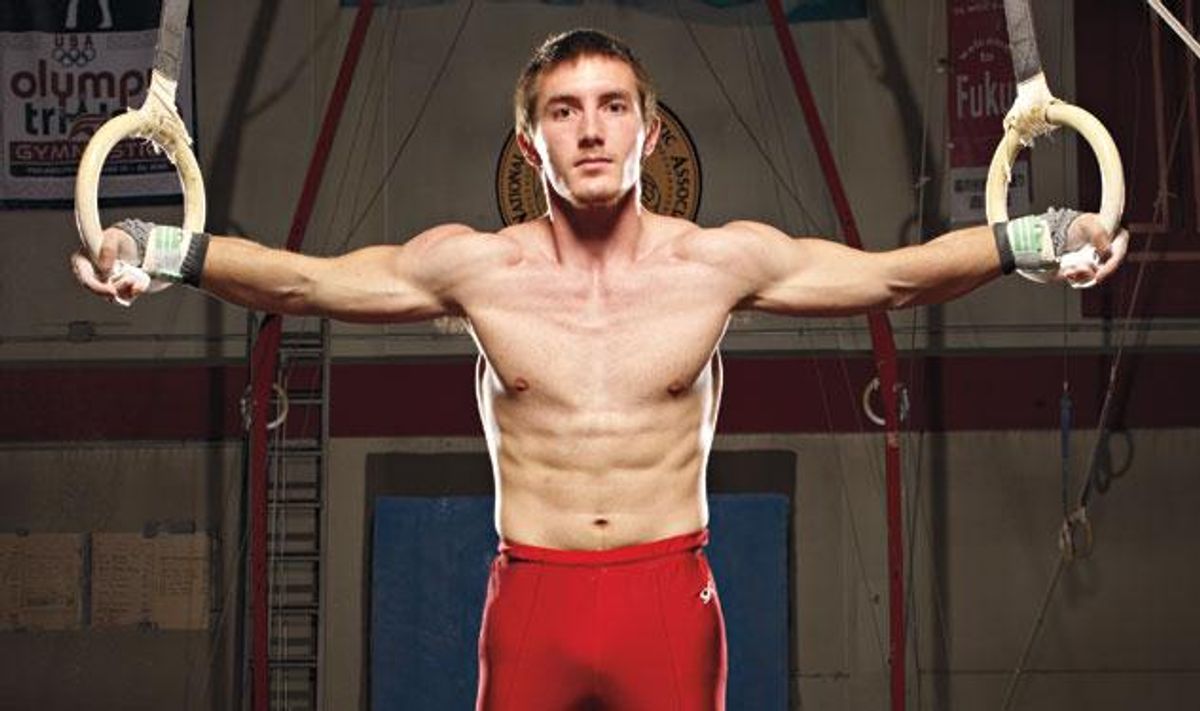Sports
Flipping Out

A pageant-winning gymnast considers the flexibility of team dynamics.
July 19 2012 8:05 AM EST
September 10 2018 5:56 AM EST
By continuing to use our site, you agree to our Private Policy and Terms of Use.

A pageant-winning gymnast considers the flexibility of team dynamics.
Photography by David Yellen
"I don't like going to my head," says Dashiell Sears, a 21-year-old rising senior at Temple University and, at 5-foot-2, a pint-sized member of the Philadelphia college's men's gymnastics team for the past three years. He's talking about his fear of floor routines, where upper-body balance -- not ego -- is key. Given the unexpected and sudden nature of his local celebrity, you would be forgiven for thinking otherwise.
Last year, Sears reigned as Mr. Gay Philadelphia, an oddly senior title for an undergrad who in conversation seems shy, wholesome, and aloof -- in spite of the occasional flash of charisma and dry wit. "There was candy and chloroform," he says describing his path to the winner's sash, "and then there was a van, and then there were lights, and Michael Musto was there."
In fact, Sears and another Temple gymnast, John Gaffney, were invited by a photographer to compete in a preliminary round at a local gay bar. "I was 20, so I was like, Well, it's one way I can get into a bar," he says. Sears placed second, but was scooped up by pageant president Bruce Yelk, who watched and thought he should've won. From there, Yelk expedited the young gymnast to the finals at Philly's Voyeur Nightclub, where judge Musto -- no, Sears wasn't lying -- made an unorthodox request during the swimsuit round.
"That was when he was like, 'Can you do a backflip for us?' " Sears says. "I did a backflip. I did another one and then a third one. And the judges were, like, 'Do other stuff!' I did some flares and I did a handstand and pressed all the way down, just hovering above the ground--it's called a swallow. And they were like, 'Oh my gosh!' "
This impromptu routine -- executed in black box-cut Lycra -- practically guaranteed his victory, but it was a rogue personal appeal, during the Q&A round, which sealed the deal. The question: Who is your favorite male designer? The answer: " 'Could I talk to Michael Musto?' " Sears remembers asking. "I sat down on the stage and I told him how I had a friend in high school who was bisexual and committed suicide. She had always talked about him and thought he was really funny and really insightful. I just wanted to say, 'I'm really glad that you are here.' "
The night ended in tears -- from the audience -- and Sears became the youngest Mr. Gay Philadelphia winner in the pageant's five years. (His favorite designer, by the way, is Calvin Klein, "because I like the underwear.")
While a large personality like Sears's could possibly clash with a team atmosphere, fortunately, two other out gymnasts, Evan Burke and Gaffney, were there to set an example. "If there was anybody on the team that had a problem with people being gay," he says, "we'd probably push them off."
In a way, men's gymnastics, which emphasizes both immense strength and finesse, is not an unlikely place for gay athletes to thrive. But while it will certainly be enjoying its quadrennial affair with national attention this summer, the sport is in dire straights. "Our men's programs in this country are shrinking," says Patrick McLaughlin, Sears's 24-year-old assistant coach. "The number of competitive, very good Division I schools are now 17. In the '80s, they were up near 80, so you're looking at a dying sport."
McLaughlin, however, notes that he's found support from the gay community in Philly, which has started showing up and cheering the team at meets. "I think when people see something that is under-appreciated," he says, "they're more likely to bounce on that if they feel a connection to their own lives."
Sears is also quick to point out the ways in which sports that value individual performances are better suited to inclusivity. "In a sport like gymnastics or swimming or diving, the fact is that if another person does well, then you do well," he says. "In a team sport, there are ways that you can exclude people from playing -- you could just not pass the ball to them. For gymnastics, if we don't put this person up, we're not gonna get that score and we're not gonna win. That means it doesn't matter if you're gay or straight or bi or whatever. If you have a good routine, who cares what everyone else thinks?"